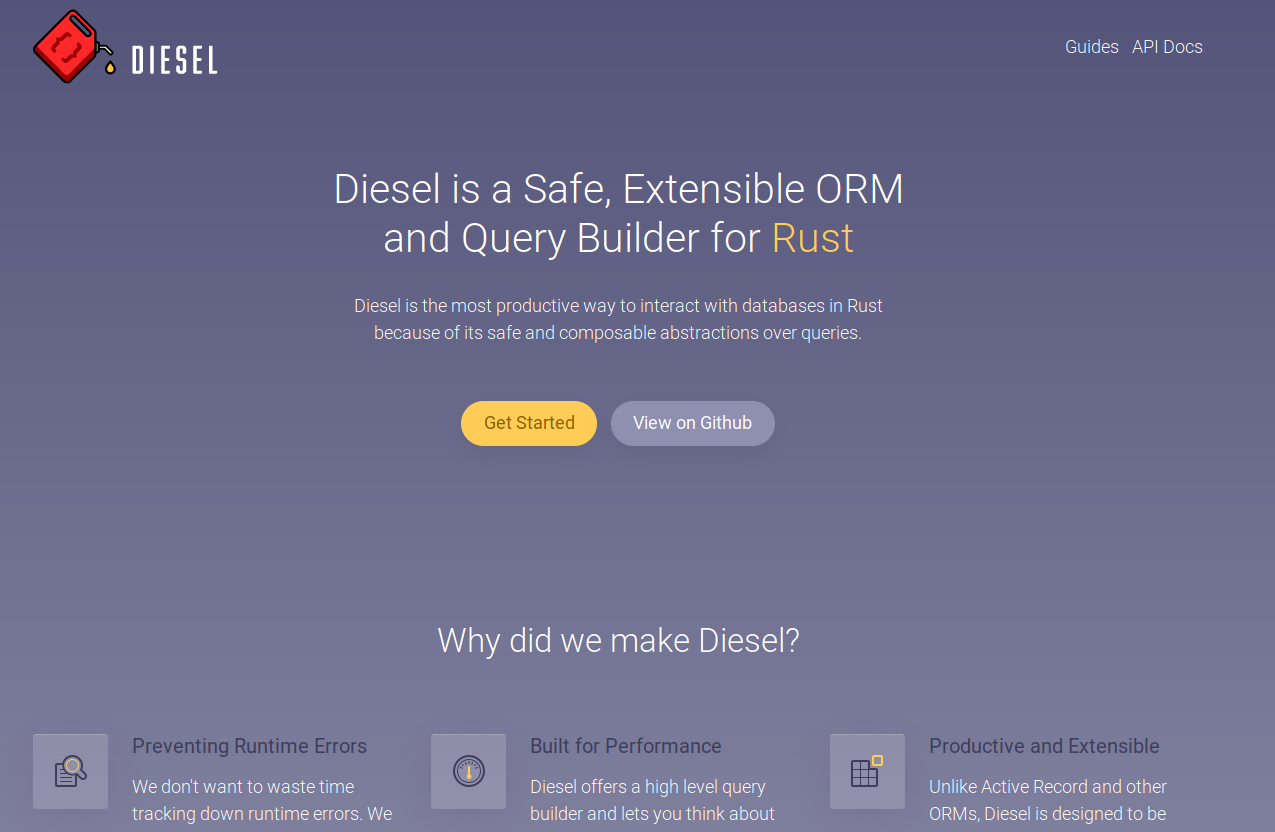仕事でdiesel使ってみた 2017-03-01 Rust # 仕事でdiesel使ってみた ---------------------- [RustのLT会! Rust入門者の集い #2 - connpass](https://rust.connpass.com/event/48826/) <!-- .slide: class="center" --> === # About Me ---------  <!-- .element: style="position:absolute;right:0;z-index:-1" width="20%" --> * κeen * [@blackenedgold](https://twitter.com/blackenedgold) * Github: [KeenS](https://github.com/KeenS) * [Idein Inc.](https://idein.jp/)のエンジニア * Lisp, ML, Rust, Shell Scriptあたりを書きます === # [diesel.rs](diesel.rs)  === # diesel --------- * RustのORM * スキーマからコード自動生成 * diesel_codegen * クエリビルダ * マイグレーション管理 * PostgreSQL, MySQL, SQLiteサポート === # 準備 ------- * [docker-composeでmysql & postgreSQL をサクッと起動 - Qiita](http://qiita.com/astrsk_hori/items/1e683a7a2f2b7189cb6e) ``` cargo install diesel_cli echo DATABASE_URL=postgres://username:password@localhost/hoge > .env diesel setup diesel migration generate create_posts ``` === # 準備 ------- ``` toml [dependencies] chrono = "0.3.0" diesel = {version = "0.11.4", features = ["chrono", "postgres", "serde_json"]} dotenv = "0.8.0" serde_json = "0.9.6" serde_derive = "0.9.7" serde = "0.9.7" [dependencies.diesel_codegen] features = ["postgres"] version = "0.11.0" ``` === # プロジェクト構成 ----------------- * モデルのコンパイルが遅いので分離したい * Cargoの[ワークスペース](http://doc.crates.io/manifest.html#the-workspace-section)機能を使う === # プロジェクト構成 ----------------- ``` $ ls Cargo.lock Cargo.toml hoge_model <- diesel_derive使う hoge_XXX <- diesel使う hoge_YYY <- diesel使う docker-compose.yml migrations ... ``` === # テーブル --------- * up.sqlとdown.sqlを書く ``` sql CREATE TABLE hoge_suites ( id SERIAL PRIMARY KEY, hoge_entry_id INT NOT NULL, hostname VARCHAR NOT NULL, status INT NOT NULL DEFAULT 0, CONSTRAINT unique_hoge_entry_id_hostname UNIQUE ( hoge_entry_id, hostname -- and other matrix ), CONSTRAINT fkey_hoge_entry_id FOREIGN KEY(hoge_entry_id) REFERENCES hoge_entries(id) MATCH SIMPLE ON UPDATE NO ACTION ON DELETE CASCADE ); ``` === # モデル -------- ``` rust // なんかいっぱいderive // QueryableとInsertableは分ける #[derive(Default, Queryable, Associations, Identifiable, Debug, Clone)] // belongs_to関係のstruct #[belongs_to(HogeEntry)] // has_many関係のテーブル #[has_many(hoge_results)] #[table_name="hoge_suites"] pub struct HogeSuite { pub id: i32, pub bench_entry_id: i32, // String pub hostname: String, pub status: HogeStatus, } ``` === # モデル -------- ``` // Insertableの方 #[derive(Default, Insertable, Debug, Clone)] #[table_name="hoge_suites"] pub struct NewHogeSuite<'a> { pub hoge_entry_id: i32, // Stringではなく&str pub hostname: &'a str, } ``` === # enumの扱い ----------- * dieselはenumのcodegenをサポートしてない * 気合 === # enumの扱い ----------- ```rust // Queryableとかはderive出来ない #[derive(Debug, Clone)] pub enum HogeStatus { Waiting, Running, Finished, Failed, Canceled, } // 手で実装 impl<BE, QB, BC> FromSql<Integer, BE> for HogeStatus where QB: QueryBuilder<BE>, BC: BindCollector<BE>, BE: Backend<RawValue = [u8], QueryBuilder = QB, BindCollector = BC> { fn from_sql(bytes: Option<&<Pg as Backend>::RawValue>) -> Result<Self, Box<Error + Send + Sync>> { use self::HogeStatus::*; match <i32 as FromSql<Integer, Pg>>::from_sql(bytes)? { 0 => Ok(Waiting), 1 => Ok(Running), 2 => Ok(Finished), 3 => Ok(Failed), 4 => Ok(Canceled), n => Err(format!("invalid status: {}", n).into()), } } } impl<BE, QB, BC> FromSqlRow<Integer, BE> for HogeStatus where QB: QueryBuilder<BE>, BC: BindCollector<BE>, BE: Backend<RawValue = [u8], QueryBuilder = QB, BindCollector = BC> { fn build_from_row<T: Row<BE>>(row: &mut T) -> Result<Self, Box<Error + Send + Sync>> { use self::HogeStatus::*; match <i32 as FromSqlRow<Integer, BE>>::build_from_row(row)? { 0 => Ok(Waiting), 1 => Ok(Running), 2 => Ok(Finished), 3 => Ok(Failed), 4 => Ok(Canceled), n => Err(format!("invalid status: {}", n).into()), } } } ``` === # クエリ -------- * モデルプロジェクトとは別 * 各プロジェクトのdb.rsで関数を定義 * SQLよりRsutのイテレータを意識した書き方 === # クエリ -------- ```rust pub fn is_hoge_finished<'a, Cn>(conn: &Cn, entry_id: i32) -> Result<bool, Error> where Cn: Connection<Backend = Pg> { use self::schema::hoge_suites::dsl::*; // SELECT ... じゃなくてsourceからfileterして最後にselect let ret = hoge_suites .filter(hoge_entry_id.eq(entry_id)) .select(status) // ここまでクエリビルダ .load::<i32>(conn)? // ここからイテレータ .into_iter() .all(|i| [HogeStatus::Finished as i32, HogeStatus::Failed as i32].contains(&i)); Ok(ret) } ``` === # 複雑なクエリ ------------- * トランザクション * join * order by === # 複雑なクエリ ------------- ``` rust pub fn pic_suite<Cn>(conn: &Cn, query: &api::worker_poll::Request) -> Result<Option<(HogeEntry, HogeSuite)>, Error> where Cn: Connection<Backend = Pg> { use self::schema::hoge_entries::dsl::*; use self::schema::hoge_suites::dsl::*; use self::schema::hoge_suites::dsl::id; // transaction conn.transaction(|| { let suite = hoge_suites // join .inner_join(hoge_entries) .filter(status.eq(HogeStatus::Waiting as i32) .and(hostname.eq(&query.hostname))) // order by .order(created_at.asc()) .select((id, hoge_entry_id, hostname, status)) .first::<HogeSuite>(conn) // NotFoundErrorをOptionにできる .optional()?; // transactionの中で普通にrustの式が書ける if let Some(s) = suite { let entry = hoge_entries.find(s.hoge_entry_id) .first::<HogeEntry>(conn)?; let suite = diesel::update(hoge_suites.find(s.id)).set(status.eq(HogeStatus::Running as i32)) .get_result::<HogeSuite>(conn)?; Ok(Some((entry, suite))) } else { Ok(None) } }) } ``` === # もっと複雑なクエリ ------------------- * 2重join * dieselは2重joinを扱えない… === # もっと複雑なクエリ ------------------- ``` rust pub fn load_all_data<'a, Cn>(conn: &Cn) -> Result<Vec<(HogeEntry, Vec<((HogeSuite, HogeResult), Vec<HogeProfile>)>)>> where Cn: Connection<Backend = Pg> { use diesel::types::{Integer, Timestamp, VarChar, Double}; use diesel::pg::types::sql_types::{Array, Jsonb}; use diesel::expression::dsl::*; use diesel::select; let status = sql::<Integer>("s.status"); let ret = select(sql::<( (Integer, VarChar, VarChar, Array<VarChar>,Timestamp, VarChar, Integer, Jsonb), (Integer, Integer, VarChar, Integer), (Integer, Integer, VarChar, Integer, Integer, VarChar), (Integer, Integer, VarChar, Integer, Double))>( " e.id, e.repo, e.committish, e.files, e.created_at, e.command, e.format, e.format_data, s.id, s.hoge_entry_id, s.hostname, s.status, r.id, r.hoge_suite_id, r.hoge_name, r.score, r.status, r.result, p.id, p.hoge_result_id, p.function_name, p.score, p.percent FROM hoge_profiles p INNER JOIN hoge_results r on r.id = p.hoge_result_id INNER JOIN hoge_suites s ON s.id = r.hoge_suite_id INNER JOIN hoge_entries e ON e.id = s.hoge_entry_id")) .filter(status.eq(HogeStatus::Finished as i32)) .load::<(HogeEntry, HogeSuite, HogeResult, HogeProfile)>(conn)?; let mut hash = HashMap::new(); for (e, s, r, p) in ret { let mut hash_entry1 = hash .entry(e.id).or_insert((e, HashMap::new())); let mut hash_entry2 = hash_entry1.1.entry(r.id).or_insert(((s, r), Vec::new())); hash_entry2.1.push(p); } let ret = hash.into_iter().map(|(_, v)| (v.0, v.1.into_iter().map(|(_, p)| p).collect())).collect(); Ok(ret) } ``` === # テスト ------- *  ̄\_(ツ)_/ ̄ === # まとめ -------- * 案外普通に使えるよ * モデルはちょっと面倒かもね * クエリは困ったらSQL生牡蠣 * マイグレーションとかはまた今度